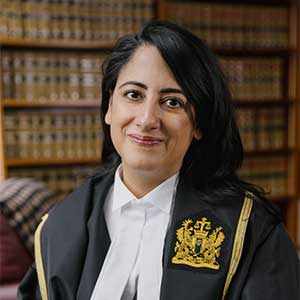 What was your path into law and onto the bench?
What was your path into law and onto the bench?
Both unexpected.
I hadn’t planned on becoming a lawyer and certainly not a judge. I did not know any lawyers or judges growing up. By the time I was finishing my undergraduate degree in international studies, I was considering two different directions: academia in the social sciences or further study geared to a service profession. I decided on the latter and moved to Toronto to do a Master of Social Work program. Later I applied and got accepted to the join law to my social work program.
I really debated about adding law. I remember being very unsure about it. I remember two moments in making this decision. First, a mature student in the social work program said to me – “if you are unsure, you should just do it “. For whatever reason, at that time, this seemed like the wisest view I had heard. Second, during a social work placement, after contacting a legal clinic on behalf of a client, I thought: “wow, they were so helpful – I could maybe do that”.
Judging was not something I had considered or planned. It wasn’t until I had practiced immigration and refugee law for a number of years and a mentor suggested it to me, that I started to think about judging as a possibility.
What experience in your legal career best prepared you for work on the bench?
I worked with hundreds of individuals and families, from different backgrounds, usually faced with a crisis in their life that required a legal intervention. No matter how many books I read, I could never match the insights I gained simply by listening to people who were in the midst of a crisis.
What advice do you have for counsel who appear before you?
When you are making oral submissions, don’t think of it as a polished presentation. Be prepared, but also be open to where the experience goes based on the judge’s questions. Don’t worry if it takes you time to find something in the record, or if you have to think a minute before answering, or need some time to get back to your submissions. It isn’t a TED talk. You are helping the judge understand your client’s position and the record from this point of view. Oral advocacy is not necessarily entertaining. The most effective moment may well be being able to find the reference in the record that answers a question that has been plaguing the judge. I know this is all easier said than done. I definitely did not follow this advice when I was a litigator!









